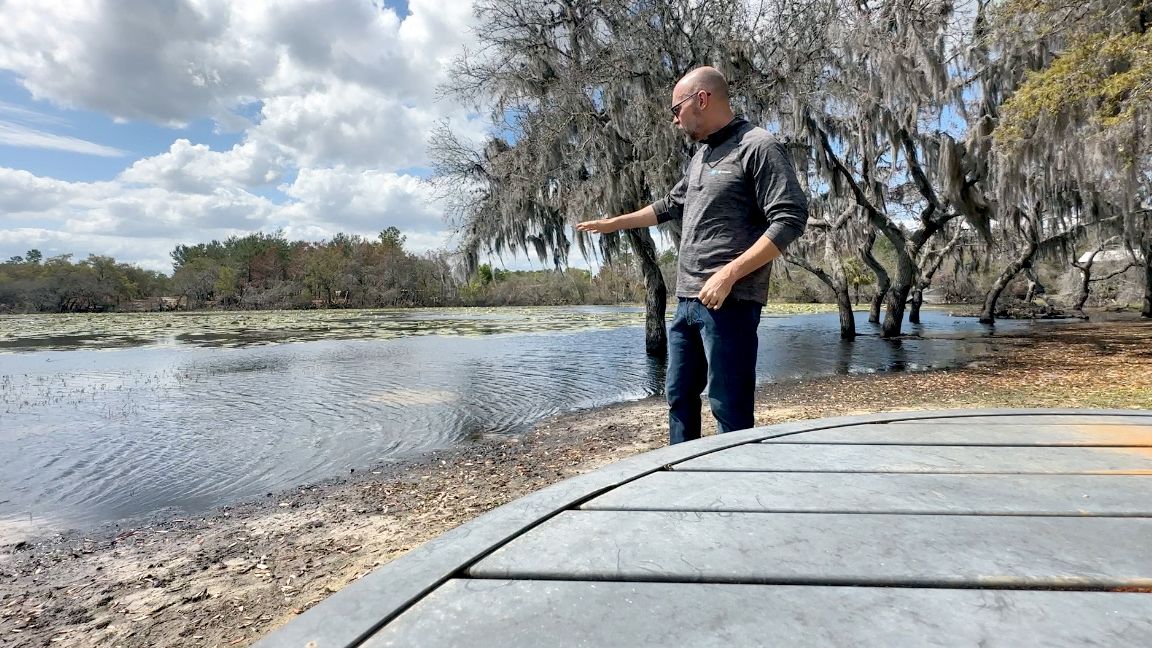VOLUSIA COUNTY, Fla. — Every minute one person is diagnosed with encephalitis around the world. That’s about half a million cases a year, according to Encephalitis International, a nonprofit that specializes in the brain inflammation disease.
Often misdiagnosed, encephalitis is an inflammation of the brain caused either by an infection invading the brain or through the immune system attacking the brain in error.
“It’s so important to raise awareness about encephalitis for lots of reasons, but not least of all because it does have this high death rate. Up to 40% of people will die depending upon the cause. And of course, those who survive the condition are often left with life-changing disabilities as a result of the injury to the brain. So, it is important to recognize this condition,” Chief Executive for Encephalitis International Dr. Ava Easton said.
Former Port Orange councilwoman Kat Atwood and her husband Ken Atwood are on a mission to educate residents and raise awareness about this debilitating disease, so nobody has to fight alone.
Watching a video on her phone, they remember the times she sang the national anthem during opening ceremonies in Port Orange. Looking at the Facebook memories brings back mixed feelings.
“Sometimes really good, you know? And other times, it reminds me how much I’m missing,” Kat said.
In September 2022, Kat was on the council in Port Orange and was at her home office taking care of some business, while her husband was in the next room.
“Our room and office share a wall. And he heard something unfamiliar. He came in and I was in a seizure. First time ever,” Kat recalled.
Ken says he quickly went into the office to help her and found her shaking violently and biting her tongue.
“I tried to keep her from hurting herself, got her to be on her side. And then I was calling 911 to get assistance because I didn’t know if it was a seizure at first or if it’s a stroke,” he said.
They would later find out what she experienced was a grand mal seizure. Kat underwent a series of tests including MRI’s, EEGs, X-rays, and CAT scans to try to figure out what was going on, but after getting all the results back, the doctors would still not have a definite answer of what was happening. It was not until about a year later when they finally got the approval to go see the Mayo Clinic Hospital in Phoenix, Ariz., to ask for assistance.
It took just over a year of more tests for Kat to receive her diagnosis in October 2023.
“It’s called autoimmune encephalitis. And my specific marker is LGI1, and that means brain inflammation. So, it’s wrongfully telling my immune system to attack my own brain,” Kat said.
She had decided to resign from the Port Orange council in January.
“We both knew something was wrong, but we just didn’t know what it was. And I knew my memory had been affected. I didn’t feel like I could serve the public wholeheartedly 100% if I didn’t have a memory. I didn’t want to vote on laws or rules that would concern the citizens and then not have any memory of it. It wasn’t fair. So, we talked about it for quite a while and I offered my resignation to the mayor, and I didn’t even go the night he read my resignation letter. It just broke my heart,” Kat said.
Kat was experiencing seizures, memory loss and difficulties keeping her balance. Her treatments involve blood infusions to suppress the immune system.
“It’s a vicious, vicious disease. But I’ve been very fortunate so far because we try to stay active. There are days when I can’t,” she said.
Autoimmune encephalitis — the type that Kat was diagnosed with — is extremely rare and known to affect about 0.83 people in a million, according to Encephalitis International. Kat said the disease caused her an acquired brain injury (ABI). Although most people are familiar with a traumatic brain injury (TBI), an ABI is similar but different. An ABI is acquired not necessarily through trauma like a TBI; it is acquired through an illness.
The same results, though, can be seen: difficulty finding words, slurred speech, coordination issues, a change in gait, and memory loss. The Atwoods are trying to raise awareness of ABI because they had never heard of it before she was diagnosed.
For Kat, having a strong support system has been crucial, from her husband, the community, her family and her parents.
“She’s very strong. And she’s not a person that will ever give up. And we just know she’s going to come through this. And as far as Ken goes, God sent us the best son-in-law he could have given us because he has just been a rock,” said Betty O’Connor, Kat’s mother.
For a long time, running had been one of Kat’s passions in life. She first started running in 2016, with local 5K’s for charity, and kept going for 10K’s and even half marathons. She has won more than 100 medals from different races across the country.
“And you run with these 2,000 people or however large a race might be, but you’re still alone in your head, which is pretty cool, you know? Because you’re just taking it all in. I never ran to win. I wasn’t that kind of a runner. It was the experience,” she said.
Now she has decided to donate all her medals to Medals4Mettle, a nonprofit organization that gives endurance race finisher’s medals to people who demonstrated mettle by dealing with disease, handicaps or similar challenges.
“And what they do is they take donated medals, and they give them to special needs adults and children. So, when they accomplish something that is huge in their world, they’ll get a medal for it,” Kat said.
Now she’s trying to find ways to exercise her mind by doing word search puzzles and other brain games.
“I challenged myself to do two a day. And sometimes I struggle, you know? And I’ll just tell Ken this is really hard on me. And he’s like, ‘Take your time,’” she explained.
The Atwoods have been working to raise awareness about the disease. Feb. 22 is recognized as World Encephalitis Day. Leading to that day, they reached out to cities across Volusia County to get proclamations signed by mayors recognizing encephalitis. So far, they have received nine signed proclamations including the City of Ormond Beach, the City of DeLand, Holly Hill, City of Port Orange, Orange City, Town of Ponce Inlet, and Volusia County Council, among others.
“It’s humbling. You know, it’s heartwarming, but it’s humbling,” Kat said.
And for the days when she is feeling down, she has a permanent reminder on her forearm, a tattoo with the phrase “Keep Going.”
“Keep going. It’ll pass. I grew up with parents who told us that, you know, it will pass. This too shall pass,” she said.
The Atwoods highlight the importance of learning about encephalitis every day using the #RedforWED hashtag on social media and in shirts as another way to start conversations and educate people about the disease.
If you or anyone you know has been diagnosed with encephalitis, you can find resources visiting Encephalitis International.









